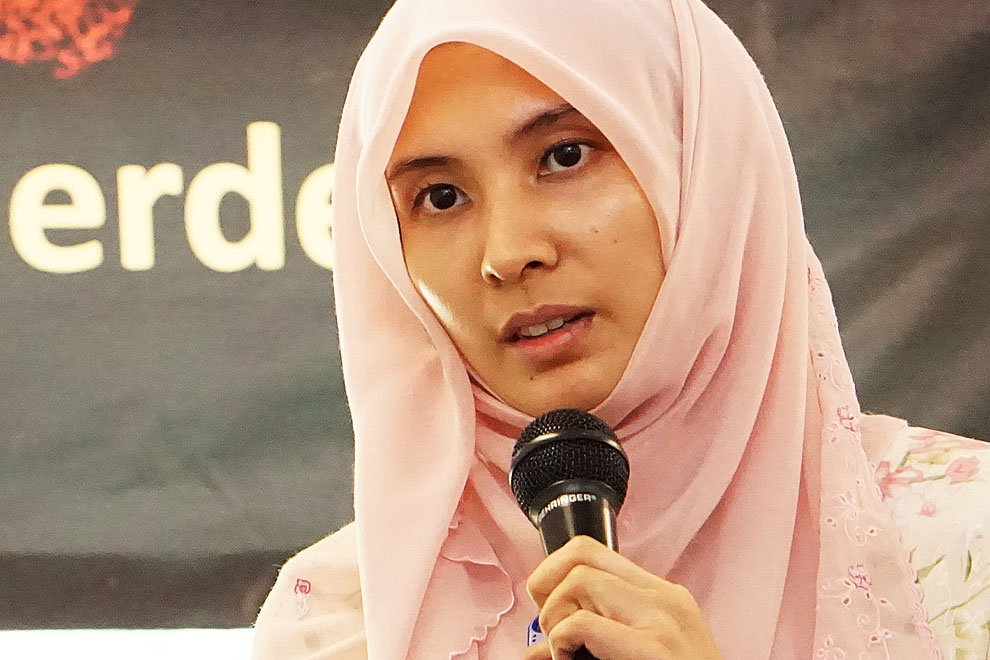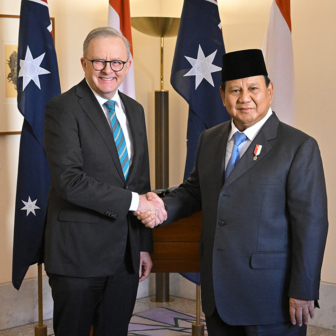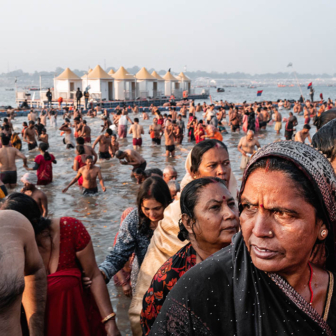With a postscript added on 27 September 2015
As Malaysia’s Muslims celebrated Hari Raya Haji – the Feast of Sacrifice – this week, American and Australian authorities warned their citizens to avoid Bukit Bintang, the popular shopping and entertainment district in central Kuala Lumpur. Authorities were especially concerned about the lively Jalan Alor eating strip, which last night remained thronged with diners enjoying Chinese food. Singapore’s Straits Times immediately linked the terror alert to warnings from Indonesia that Malaysian Islamic State fighters are known to be training in Poso, on Sulawesi. Authorities in Singapore have also recently warned that terrorist activity is again on the rise across the region. To contain the threat that terrorists pose, Indonesia and Singapore both rely heavily on Malaysia – a major transit point for foreign fighters heading for Iraq and Syria, including from Australia. Yet with the nation’s new redshirt movement warning of a possible rally and race riot this weekend, the Malaysian authorities are themselves embroiled in a serious crisis with identity politics at its heart.
The renewed unrest began on 16 September when a group of more than 800 protesters tried to push through a police barrier blocking the entrance to Petaling Street, a bustling market not far from Jalan Alor. Dressed in red, the protesters chanted “Long Live Islam!” and “Long Live Malays!” Even though the market’s traders had stayed away that day, the protesters were determined to pass through the colourful archway that helps code Petaling Street – like Jalan Alor – as a “Chinese” place in Malaysia’s capital city.
This was only a small part of a much larger crowd of protesters brought together by the slogan, “Malay dignity.” Now described as “redshirts” – a label borrowed from neighbouring Thailand – around 45,000 of these protesters had been gathering all morning in Padang Merbok, a large, open reserve off Parliament Street, about half an hour’s walk away. Groups of redshirts had poured into the city from around the peninsula on 2000 buses commissioned for the occasion, including one bearing the branding of Taylor’s University, a private institution in Subang Jaya. Taylor’s later sacked its shuttle bus contractor Wawasan Sutera for its unauthorised use of the vehicle.
The problem for Taylors’s – and the Petaling Street traders – was the atmosphere of racial and religious intimidation created by the rally. The redshirts were pulling every lever they could to demonstrate their mastery of Malay Muslim symbolism. They had gathered at a number of central locations associated exclusively with Malayness and Islam, including the National Mosque, the Federal Territories Mosque and the Putra World Trade Centre, where UMNO, the governing United Malays National Organisation, has its headquarters. Another group of protesters had gathered outside Kraftangan, the Malaysia Handicraft Development Corporation – a hot and tiring sixty-minute march away from Padang Merbok. This group of around 5000 redshirts was led by rally organisers through the streets of Bukit Bintang, despite a police ban on protesters entering the area.
Even with the ban, up to 300 redshirts were already inside this area, gathered on a shopping and nightclub strip in the heart of Bukit Bintang. They were standing right in front of Sungai Wang Plaza, a mall that now seems old-fashioned compared with new favourites like Pavilion, guarded that afternoon by a row of armed police. The fact that redshirts had gathered there was no coincidence. Sungai Wang stands directly in front of the high-tech gadget emporium Plaza Low Yat, which itself was the scene of an ugly racial brawl in July.
Low Yat is also strongly coded as a “Chinese” place, and the July brawl began there when a Malay Muslim youth apparently stole a smartphone after arguing with a Chinese trader he accused of scamming him with a counterfeit model from China. Later, a larger group returned to vandalise the shop, and on the next night a crowd gathered by Malay Muslim organisations returned to chant “Allahu Akbar!”, along with “Smash it!” while vandalising property.
The main entrance to Low Yat and around half its shops were closed on 16 September as a second group, now 7000-strong, marched through Bukit Bintang. Meanwhile, the group at the entrance to Petaling Street had apparently become agitated. Police – visors down and shields up – sounded their warning siren twice and warned the crowd to disperse. After starting up a chant of “We’re coming in!” the crowd began a four-hour push to enter the market. Police were pelted with bottles and other rubbish, to which they responded by firing water cannons.
UMNO-linked rally leaders speaking at Padang Merbok quickly denounced the fracas, and the Petaling Street crowd finally began to disperse after rally leader and UMNO division chief Jamal Yunos intervened. Questioned later, he demanded that the authorities act against counterfeit goods – a phenomenon also racially coded as “Chinese,” especially after the Low Yat incidents.
Jamal has since warned of a “99 per cent” possibility that another rally – “and maybe a riot” – will take place on Petaling Street on 25 September if authorities don’t compel traders to divide their incomes with Malay Muslims, who in return will share with them the nation “they” liberated from Britain.
The redshirts have emerged from the politically charged interaction between three key organising principles in Malaysian public life: race, religion and a sixty-year-old government in crisis. They reflect a confluence of forces unleashed by the critically important election result in 2013, and the subsequent litany of national and scandals centred on embattled prime minister Najib Razak. The redshirts’ charged political rhetoric is raising concern that the threat of violent retribution against Malaysia’s Chinese is building to a point where it might not be contained.
The redshirts were drawn from around the Malay Peninsula – especially rural settlements established by Malaysia’s Federated Land Development Authority – and from UMNO divisions led by Najib’s supporters. Najib, currently in New York ahead of a planned address to the UN General Assembly, is facing money-laundering investigations in the United States over financial transactions by the indebted national strategic development fund One Malaysia Development Berhad, or 1MDB. The US Justice Department is also looking into luxury New York property purchases by companies linked to Najib’s stepson Riza Aziz – producer of The Wolf of Wall Street (banned in Malaysia) – and former 1MDB staff members.
Malaysian publication The Sarawak Report, which claims to have funnelled information about 1MDB to the FBI, was also recently banned by Najib as he moved to shut down a Malaysian investigation into 1MDB. The 1MDB taskforce established by the Malaysian Anti-Corruption Commission was quickly disbanded, and its offices were later raided by police. Najib co-opted four of its members to his own cabinet, and sacked the attorney-general, followed soon afterwards by his deputy prime minister Muhyiddin Yassin.
Muhyiddin had not himself been serving on the taskforce, which was tracking the US$700 million apparently channelled by 1MDB into Najib’s personal accounts. Instead, he criticised Najib directly by pointing out that the scandal was causing UMNO to lose so much credibility that it would surely lose the next election, scheduled for 2018. Indeed, the last election resulted in such a strongly contested victory for UMNO that it could only be described as humiliating for Malaysia’s seemingly permanent ruling party.
Having won with a popular vote of only 47 per cent, UMNO was returned to power by the system of elaborate gerrymandering and malapportionment that creates many more rural seats – where Malay Muslim support for UMNO remains relatively strong – than urban ones. Indeed, since the 1MDB scandal broke, some of Malaysia’s irreverent political blogs have speculated that the funds channelled through Najib’s accounts were spent on fighting the election.
In fact, UMNO has resisted adapting to the competitive state of Malaysian politics since the 2008 and 2013 elections. Malay Muslim voters can no longer be portrayed as a unitary electoral bloc, and they are no longer content to treat UMNO as the only legitimate channel through which to advance their interests. Yet leading Malay-language newspaper Utusan Malaysia responded to the 2013 election result with the racially charged question “What more do the Chinese want?”. UMNO’s argument is that Malay Muslims are under threat by increasingly assertive Chinese, and Najib has recently called for his supporters to rise against the “insult” delivered to their leader.
Malaysia’s elections attract frequent criticism from Human Rights Watch and other organisations, and from local NGOs including the Bersih coalition, which has agitated since 2007 for “clean” elections. Around a month ago, Bersih organised a rally, Bersih 4.0, in which around 100,000 people, mostly dressed in yellow, filled the streets of Kuala Lumpur to demand free and fair elections, transparent government and the right to demonstrate.
The rally stretched over two days, ending before an official state-led parade celebrating Malaya’s independence from Britain. Aerial photographs showed that the rally was larger than the Merdeka (Independence) Day parade organised by the government the following day. Yet the Islamist party PAS had refused to mobilise its members for the rally and government agencies had barred all civil servants from attending. As both of those constituencies largely consist of Malay Muslims, the rally appeared disproportionately “Chinese.”
Debates about Bersih’s Chineseness ignited immediately. The government-linked media denounced the rally as an assertion of Chinese power in a nation that belongs to Malay Muslims. Opposition Twitter feeds pointed out that the rally’s racial makeup reflected voting patterns: Malaysia’s Chinese appear to have largely turned against the nation’s government, and the Malay Muslim constituency it purports to represent is now irreparably fractured. With the number of Malay Muslim participants being strongly played down by UMNO and its supporters, Bersih’s social media channels began circulating images of racial harmony at the rally. Among them were photos of Chinese protesters sharing bottled water with Malay Muslims washing for prayer, and footage of Chinese encouraging each other to quieten down and make space for the prayers to proceed.
Organisers also released a Facebook video showing aerial photographs of the enormous rally, interspersed with close-ups of protesters belting out Malaysia’s national anthem. “Happy Merdeka Day,” the video said. The message was unmistakeable: Bersih was claiming to represent this diverse nation better than the government could, and its participants no longer needed UMNO to manage relationships between Malaysia’s Muslims and its non-Muslims. The plural society model favoured by UMNO could easily be replaced by something more organic, something verging on intercultural cooperation in the service of a larger, truly national, cause.
The day before Bersih 4.0, a group of men dressed in red shirts misleadingly labelled “Bersih 4 Security” gathered outside the Sogo department store on Jalan Tuanku Abdul Rahman. Smashing roof tiles and planks on their backs and heads, they performed sequences of silat – a martial art steeped in Malay Muslim mysticism. Silat’s “cultural accretions” are not always approved of by religious purists, but it has been a symbol of cultural nationalism throughout Malaysia’s history, and its clubs have long been involved in political activity. Opting not to rally on the same day as Bersih, the group’s spokesperson, the same Jamal Yunos, promised instead to organise a Malay Muslim “self-defence” rally on 16 September.
The date was important. This is Malaysia Day, commemorating the day in 1963 when the Federation of Malaysia was formed from Malaya, Singapore and the Borneo states of Sabah and Sarawak. The rally, later renamed the “People’s United Assembly,” was organised by Pesaka, the National Silat Federation, led by Muhammad Ali Rustam, a former UMNO chief minister for Malacca. He shared this effort with Jamal Yunos, working in his capacity as head of the Malaysian Confederation of NGOs, a group of at least 250 organisations brought together around Malay Muslim identity. Jamal had also organised a public protest pouring red paint over an effigy of Bersih leader Maria Chin Abdullah, a Chinese woman who is also Muslim. Described by Singapore’s Straits Times as “a kindly auntie,” Maria has been a civil rights activist since the 1980s. Her late husband Yunus Ali, who was a PLO commando while in exile in Palestine and Lebanon, was also a life-long political activist.
Yunus went into exile as a result of his involvement in Malaysia’s increasingly radicalised student movement around the time of the 1969 election – the last time an UMNO-led government was delivered such a heavy electoral blow. One other important activist at the University of Malaya during this period was Anwar Ibrahim, now leader of the opposition coalition, the People’s Alliance, which won the popular vote in the 2013 election. After he claimed victory in a “stolen” election, Anwar – who was UMNO’s deputy prime minister in the 1990s – was sentenced to a second prison term for sodomy in February. Anwar’s daughter, opposition politician Nurul Izzah, recently returned from a US lobbying trip. There, she pointed out that the racial and religious threats unleashed by Malaysia’s decomposing political system may no longer be containable by the authorities.
Since Anwar was jailed, the People’s Alliance has disintegrated amid discussions of a Malay Muslim “unity” government that might implement hudud punishments as part of a wide-ranging Islamisation of the Malaysian state. This realignment later stalled, but one of the People’s Alliance parties, PAS (the main Islamist supporter of hudud) has refused to cooperate with the multiracial coalition since reconstituted as Pakatan Harapan, the “Alliance of Hope.” But the new coalition has enlisted a group of former PAS leaders, who have since established Amanah (Trust), a new party that argues Islamists can and should join in political alliances with non-Muslims.
In light of the system’s convulsions, yesterday’s terror alert is potentially incendiary, depending on what transpires in the days and weeks to come. Nevertheless, such moments have passed before, and Malaysians’ sanguine understanding of their nation’s politics has seen them through almost every crisis with their capacity for tolerance largely intact.
Former prime minister Mahathir Mohamad was a master of the art of threatening racial and religious violence, but then dialling back the threat just as it began to frighten the public. Mahathir has often called for Najib to step down, citing a desire to protect UMNO’s legitimacy as his reason for intervening. Installed after a sudden electoral surge by Anwar’s People’s Alliance in 2008, prime minister Najib’s moment came when his predecessor Abdullah Badawi was blamed by Mahathir for UMNO’s poor performance. Mahathir’s faction has not been able to depose Najib in the same way it acted against Abdullah, prompting Mahathir himself to attend Bersih 4.0. There, he issued a brief statement about people’s power, the political force he had always worked to contain. He also remains involved in internal UMNO intrigue.
Last weekend, a former UMNO division chief connected with Mahathir was arrested before he left for the United States to share 1MDB information with the FBI. He has been detained without trial under Malaysia’s Security Offences (Special Measures) Act, which replaced its notorious Internal Security Act in 2012. The new Act contains enhanced measures for dealing with terrorism as well as a wide range of actual and purported threats to public order. This year, the Malaysian parliament passed an additional Prevention of Terrorism Act, which now allows for detention without trial to continue for up to two years. Public concern is growing that Najib will use these legislative instruments to stifle investigations into 1MDB, especially if enabled by a climate of fear around terrorism.
Najib himself is determined to ride out the crisis. Indeed, it seems to appear that nothing will move him. Meanwhile, senior UMNO figures are growing increasingly critical of the racial and religious rhetoric. One such leader, Saifuddin Abdullah, CEO of the Global Movement of Moderates Foundation established by Najib in 2010, has begun to call for new forms of politics to protect social cohesion. Now seen as too friendly with the opposition, Saifuddin is under investigation by UMNO for having attended the launch of Anwar’s Alliance of Hope.
In Johor state, meanwhile, the royal family has issued a series of statements obliquely criticising Najib for corruption and racism. Among their outlets are the social media accounts managed by the Crown Prince, who is also president of the Johor Football Association and its team, the Southern Tigers. Followed by more than a million people, the team’s Facebook page is an important platform for the prince, who attracted a rally of 2000 Malaysians outside his palace after the government criticised his statements earlier this year. It seems that Malaysians are increasingly mobilising through whatever associations they can join, more of which are becoming politicised as citizens tire of the heightened tension.
Meanwhile, investors, already worried by UMNO’s contradictory statements about the disappearance of Flight MH370, have started taking their capital out of the country. Foreign funds have sold nearly US$4 billion in Malaysian shares this year alone, and the ringgit has fallen sharply against the US dollar, increasing inflation and diminishing Malaysians’ purchasing power. Commodity prices are in decline, as is economic growth in a nation which exports crude and palm oil. As the scandals drag on and Najib digs in, a former activist from Wanita UMNO (UMNO Women) has filed applications for his assets to be frozen after accusing him of having “pissed” on the rest of the party.
As recently as last week, Malaysia’s poet laureate Samad Said stated that the current national climate of street mobilisations and a collapse of public trust contained all the triggers for a declaration of emergency. Samad himself has recently joined the Democratic Action Party, or DAP, one more component of the new coalition campaigning for Anwar to become prime minister. The DAP is also strongly associated with the “Chinese,” and has pushed its Malay Muslim activists forward to counter this perception. In 1969, it was the DAP’s strong electoral showing that triggered anti-Chinese pogroms around Kuala Lumpur, after which Malaysia’s King declared a nationwide emergency. In the following election, in 1974, the Islamist party PAS ran alongside UMNO to help re-establish the familiar system of racial and religious bloc politics.
Malaysia has a long history of emergency declarations that suspend civil liberties and clamp down on public opposition. This is especially the case if that opposition breaks out of the racial and religious boundaries created by the state. Tomorrow’s threatened redshirt riot in Petaling Street is an attempt to restore the boundaries breached by Bersih 4.0. In the midst of all this turmoil, last night’s terror warnings could exacerbate the climate of foreboding, with any false political move ultimately proving the poet Samad right.
For Australia, the time to engage Malaysia with smart new forms of public and private diplomacy – not only focused on terror and foreign fighters but on social cohesion across the region – has now arrived. •
Postscript: Kuala Lumpur has been brought back from the brink of racial and religious violence over the weekend, in a sequence of developments following the decision of the United States to issue a terror alert for Jalan Alor.
Media sources say that the alert was linked to reports of increased Islamic State activity in Malaysia. On Friday night, Malaysia’s counterterrorism unit detained three men, about whom little information has been released. The men – Malaysian, Indonesian and Syrian – can be held without trial for up to two years under Malaysia’s Prevention of Terrorism Act.
Police also arrested redshirt leader Jamal Yunos, who they detained for twenty-four hours to ensure he could not organise a rally – and “possibly a riot” – directed against Chinese traders in nearby Petaling Street. Jamal has since been released, and is threatening to sue the “pro-opposition” media for portraying him as a threat. Large numbers of police were also deployed in the area on Saturday, and no redshirt rally took place.
Former prime minister Mahathir Mohamad is accusing prime minister Najib Razak of manufacturing the redshirt crisis, and opposition spokespeople are arguing that the redshirt spectacle is designed to distract from the 1MDB scandal and the nation’s economic woes.
This weekend’s developments have also introduced China as a new actor on the Malaysian stage. Chinese ambassador Huang Huikang visited Petaling Street on Saturday bearing mooncakes for its traders while stating that China opposes terrorism. His public statements referenced Jalan Alor, Chinese nationals, regional economic development and China–Malaysia trade. Yet his visit was to Petaling Street, whose Chinese traders are likely all Malaysians, who may have little or no specific connection to China or its interests.
The Malaysian Ministry of Foreign Affairs has since summoned the ambassador to explain his actions, and Malay Muslim nationalist organisations have begun to issue statements decrying external interference in Malaysia’s sovereign politics. Such statements are usually directed at the United States, yet now the question of Malaysian social cohesion is an arena for Chinese power. As a result, Chinese Malaysians may have reason to wonder if they might attract yet more public denunciations.
The US terror alert has provided cover for Malaysia to step back from its flashpoint. Nevertheless, the stage is set for the next instalment in its slowly-unfolding – and ever more dangerous – political crisis. And each time the crisis heats up and cools down again, levels of public trust decline even further.




